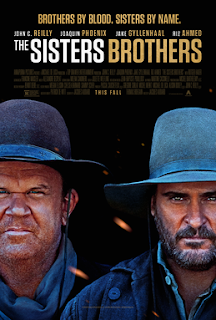The Sisters Brothers
There was a time when dozens of Westerns were made a year, and most of them weren't memorable. Now just a few Westerns are made a year, so they have to be "important," which usually means they are about something else. The Sisters Brothers, directed by Jacques Audiard, could have just been a straightforward Western, and it might have been better. Instead it seems to want to say something profound, but can't find the words.
The brothers in question are John C. Reilly and Joaquin Phoenix. Reilly is the older brother, more sensible and sentimental. Phoenix is a violent drunkard. They work as assassins in the Pacific Northwest for a wealthy man known only as the "Commodore." When he wants somebody killed, he sends the brothers, and they always get the job done.
For this particular mission, they are to find a prospector (Riz Ahmed), who has discovered a chemical that can find gold. Aiding the brothers is a scout (Jake Gyllenhaal), who finds Ahmed but while holding him comes to like him, and his idea for a utopian society.
By the end there are shifting alliances, lots of dead people, and an anticlimax (it reminded me of Lonesome Dove, when you're waiting for Call to kill Blue Duck, but he doesn't).
The Sisters Brothers (the terrible title may be part of why it bombed at the box office) could be about greed, or brotherhood, or not let spiders get in your mouth while you're asleep. Clanking around in there is an old-fashioned oater, and when it sticks to the basics it's pretty good. The one big gunfight is shot clumsily in the dark, but the freedom of the West comes across--it's not many Westerns that actually feature the Pacific Ocean.
Audiard, who has made a variety of interesting pictures, like A Prophet and Rust and Bone, comes at the American art form with a European vision. In the extras he says he wasn't making a Western, just a story that happens to be set in the Old West. I get that, but I'm not sure he understood the appeal of the Western, which is the American myth, so by making a Western but not intending to, it seems confused.
He uses a few tricks here and there, such as irising as done in silent films, or having a character reveal exposition by facing the camera in a pool of light in a black room. These theatricalities are peculiar but don't really make the story more interesting.
The actors are all good. I was kind of jostled by seeing Phoenix and Gyllenhaal together in a film, as I frequently mistake one for the other in my mind, but that's probably only me. Reilly is the star here, though, a man who goes along in a terrible profession just to protect his brother. He is also one of the few gunfighters you'll see mourn the death of his horse.
The brothers in question are John C. Reilly and Joaquin Phoenix. Reilly is the older brother, more sensible and sentimental. Phoenix is a violent drunkard. They work as assassins in the Pacific Northwest for a wealthy man known only as the "Commodore." When he wants somebody killed, he sends the brothers, and they always get the job done.
For this particular mission, they are to find a prospector (Riz Ahmed), who has discovered a chemical that can find gold. Aiding the brothers is a scout (Jake Gyllenhaal), who finds Ahmed but while holding him comes to like him, and his idea for a utopian society.
By the end there are shifting alliances, lots of dead people, and an anticlimax (it reminded me of Lonesome Dove, when you're waiting for Call to kill Blue Duck, but he doesn't).
The Sisters Brothers (the terrible title may be part of why it bombed at the box office) could be about greed, or brotherhood, or not let spiders get in your mouth while you're asleep. Clanking around in there is an old-fashioned oater, and when it sticks to the basics it's pretty good. The one big gunfight is shot clumsily in the dark, but the freedom of the West comes across--it's not many Westerns that actually feature the Pacific Ocean.
Audiard, who has made a variety of interesting pictures, like A Prophet and Rust and Bone, comes at the American art form with a European vision. In the extras he says he wasn't making a Western, just a story that happens to be set in the Old West. I get that, but I'm not sure he understood the appeal of the Western, which is the American myth, so by making a Western but not intending to, it seems confused.
He uses a few tricks here and there, such as irising as done in silent films, or having a character reveal exposition by facing the camera in a pool of light in a black room. These theatricalities are peculiar but don't really make the story more interesting.
The actors are all good. I was kind of jostled by seeing Phoenix and Gyllenhaal together in a film, as I frequently mistake one for the other in my mind, but that's probably only me. Reilly is the star here, though, a man who goes along in a terrible profession just to protect his brother. He is also one of the few gunfighters you'll see mourn the death of his horse.

Comments
Post a Comment